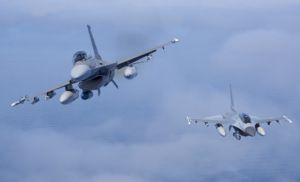News
Russia challenging Danish skies more often
This article is more than 2 years old.
New Defence figures showed that Danish fighter jets scrambled far more frequently in 2022 compared to previous years

Denmark’s F-16s saw more action in 2022 (photo: Forsvaret.dk)
The War in Ukraine looks to have emboldened Russia to ‘test’ Denmark’s airspace with increased frequency.
New Defence figures reveal that Danish fighter jets were forced to scramble to intercept foreign military planes twice as often in 2022 compared to previous years.
Denmark’s F-16s were forced into the skies 80 times last year – a significant uptick compared to 2021 (30), 2020 (42), 2019 (47), 2018 (38), 2017 (37), 2016 (21) and 2015 (40).
READ ALSO: Russian ambassador’s knuckles rapped over intrusion in Danish airspace on Friday night
Many close encounters
“It’s an expected consequence of the general increase in traffic in the area – by sea and by air,” said General Flemming Lentfer.
“The War in Ukraine means that all nations with an interest in the Baltic Sea have enhanced their presence. That goes for Russia as well as the NATO countries.”
Typically, Denmark’s F-16s are scrambled to investigate suspicious radar activity – most cases involve Russian aircraft heading for Denmark only to peel off before reaching Danish airspace.
Often, these encounters involve Danish and Russian planes coming into such close proximity to one another that the pilots can make eye contact.
Actual breaches of Danish airspace are rare. Last year it only occurred twice … once by sea and once by air.










































